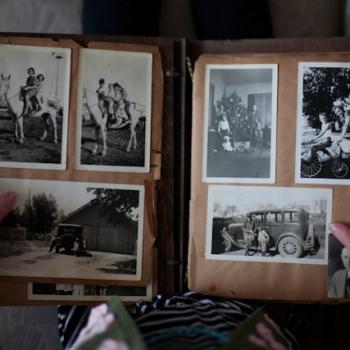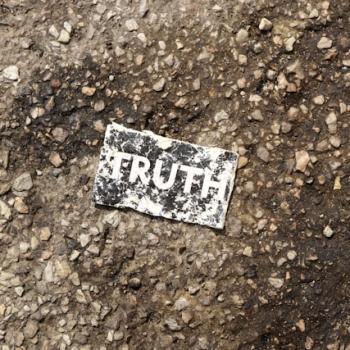
In my first post, Illumination: How Can Stories Reveal God to Us?, I introduced the idea that, while the Bible will always be the primary source of revelation God has chosen for the modern world, fiction has a lot to tell us about God should we invite Him into the experience. In this post, I would like to invite God into a reading of Aldous Huxley’s dystopian sci-fi novel, A Brave New World. While you can pull so many themes and messages from this well-known classic, I think the best question for us to start with is the same one Huxley himself posed: What is a better dedication of our time? Should we choose pleasure or purpose?
Degraded Pleasures
I did not understand what I was getting into when I opened the audiobook for Brave New World.
I had borrowed the audiobook on Libby to listen to at work. While filing one day, I turned it on and turned it up to full volume to listen while I put the papers in their appropriate places. About ten minutes later I turned it off, blushing deeply and hoping no one had heard.
The first chapter of this novel covers the genetic development of the caste systems of human beings and the various Pavlovian training for each. While it does drag in places, the concepts are incredibly fascinating. We are introduced to the building where the nation’s children are essentially grown, and given a tour of the process along with some of the main characters. The book is quick to show us how developing children are exposed to Pavlovian conditioning through repeating proverbs which reinforce the expectations of their behavior.
An example is the phrase “Everybody belongs to everybody else.” which serves as an encouragement towards sexual promiscuity. “A gramme in time saves nine.” encourages drug use to reduce anxiety. “Ending is better than mending.” is another to encourage excess spending. The culture is encouraged toward placidity and happiness
These slogans are only for the upper class. Individuals in the lower classes are genetically altered not for beauty and placidity, but for stupidity and eagerness to please. The slogans they are fed, and the childhood training they receive, make them utterly delighted to serve the higher castes. While conditions may not be as desirable as those of the higher classes, joy is still a primary objective.
We learn later that there exists, outside of this strictly controlled environment, “reservations” full of wild humans. These are the rundown cities and towns of America where people conform to such “old-fashioned and regressive” concepts like religion, family, and pain without medication.
The audience’s introduction to the world depicted in this book is shocking. After a few droning paragraphs of exposition, we stumble on a scene of a caretaker disciplining a child who refused the “sexual play” of one of their classmates. The blatant on-page description of children conditioned and encouraged toward sexual exploration at a very tender age made me rush to turn off the audiobook at first.
While the opening chapter is a bit of a jarring experience, the depravity of the rest of humanity throughout the book is a bit less so. Their way of life may seem immoral, but I think the sad truth is that it’s not that deviant to the reader’s experiences in the real world.
In Brave New World adults avoid marriage, instead sleeping with someone new every night. Repeating a sexual experience more than three times is considered rude and selfish. Repairing damaged items, patching clothes, or even cleaning is not just thought of as silly, but as low or foolish. Any emotion other than happiness is fixed with drugs, which are dispensed everywhere freely. The upper class is taught that their lives should be free of any real toil, frustration, or sorrow. Age and illness can be treated and cured, or the afflicted individual is killed. Even childbirth has been relegated to machines.
In short, Pleasure is the ultimate pursuit of the entire fictional society.
All Consuming Purpose
In contrast to the depraved pleasure-wallowing of the upper class, stands one of our protagonists: John. His mother was an upper-class tourist to the Reservation, who became lost. She eventually married and made a life for herself, replacing the pleasure and drugs she was familiar with for abuse and alcohol.
John grew up in a reservation culture. He commits self-flagellation to worship the synchronistic god of the tribes. His strongest desire is for marriage and family and he views sex outside of that institution as sinful. Unlike his mother, who struggled to understand a monogamist relationship, his romantic jealousies are healthy and rampant. So too, is his desire for and understanding of love and distaste for unfettered lust. His greatest loyalties are to religion and an old copy of Shakespeare’s works.
When John and his mother return to the city, John is excited at first. However, as the reality of his new world crashes in on him, he begins to despair. His mother, struggling to overcome trauma in a world that doesn’t recognize its existence, turns to drugs. John fascinates people and quickly becomes a focus of social veneration. Women are happy to give their bodies to him, but none have any concept of love. None would be willing to be a wife or a mother. The endless entertainment and pleasure, as well as the disdain for anything resembling religion, quickly rings empty for him.
John’s life quickly spirals into rage and violence both towards those around him and himself. The World Controller exiles John to a lighthouse where he can keep up a schedule of back-breaking labor and self-flagellation in an attempt to find the meaning and purpose that had been present in his life on the reservation.
Eventually, even that is not enough. When he falls prey to the temptations he had been trying to push away, John’s guilt drives him to take his own life.
John understood that true and abundant life requires more than pleasure to endure. The endless stream of hollow addictions the modern world pursued was not enough to distract John from the hopelessness of a life with nothing to work for, nothing to look forward to, and nothing to fight for.
John’s indwelled him with a sense of purpose since childhood. He lost it when he was transplanted, and, despite all his best efforts, he couldn’t create a new meaning for his life afterwards. While the culture could not comprehend the idea of purpose, John had tasted and seen how much value it brought to everything, and the absence of it shattered him.
Pleasure and Purpose in Competition.
Pleasure and purpose are two values that constantly come into conflict. There is a scarce situation, apart from the full sanctification of your emotions, where they can co-exist..
Take, for instance, weight loss. I’m currently on a (constantly failing) weight loss journey for health reasons. Even if I can train myself to enjoy a good healthy meal or a great workout, I will never get off the couch or put down the chocolate if I don’t choose to serve the purpose of getting healthy.
Or take finances as an example. I may be trying to save up for land and a house, and for a safe nest egg, but that means denying the temporary pleasures like ordering Uber Eats for the tenth time this week, or buying the expensive boots that I want to wear in the 90-degree Florida autumn.
Pleasure is often a catalyst for sin. James 1:14 says “But each person is tempted when he is lured and enticed by his own desire.”
The correlation is so strong that so many words in our modern language cross the idea of sin and pleasure. Many describe chocolate as “decadent”, a word that originally meant “moral and cultural decline.” I’ve very regularly heard a good dessert described as “sinful.” Words like “bad”, “wicked” and “sick” have all taken their turns as trending descriptions of something cool or in vogue.
People associate the very word “pleasure” with sexual sin.
In contradiction to pleasure’s association with sin, scripture encourages us to dedicate ourselves to purpose. John 15:13 comes to mind for me. It states “Greater love has no one than this, that someone lay down his life for his friend.”
Christ told us that anyone who comes to him must hate his own father, mother, wife, and children. (Luke 14:16). Of course, he is using this language to mean that our love for God must make those loves look like hate in comparison. Still, we honor soldiers who left behind wives and children to die for our country. We consider children who stand up against wicked or oppressive parents even if it costs them their family ties. We see teachers and leaders who contradict the evil values in their society as heroes, even if they lose their jobs and respect in the process.
Even in secular society, we idolize people who dedicate their lives to a bigger purpose. Those who sacrifice themselves for something more important.
Finding Balance.

Should we then associate all pleasure with evil? Is a higher purpose always good?
The Baal worshipers who burned their children alive also sacrificed their families for a higher purpose. So are many of the women who choose to abort their unborn children.
Martyrs are often glorified, and what is a martyr but someone who has paid the ultimate sacrifice for a higher cause? While martyrs may have brought us the translated Word of God, ended the evils of the Roman Coliseum, and brought the gospel to countless unreached people groups, martyrs also flew the planes into the World Trade Centers.
Few people will argue that romantic love isn’t a good purpose. We universally praise a husband and wife who have been together for decades and are still in love in their old age. The man who sacrifices his life to protect the woman he loves, and who jealously guards her from all others, is the focus of many romantic novels. Romantic love also motivates the man who kills his ex-girlfriend so no one else can have her.
In contrast, while we frown on pleasure in many contexts, science shows how valuable self-care or “Sabbathing” is to our health and ability to serve others better. Stress is horrible for our mental and physical health.
Few will fault people who take great pleasure in the natural world. And those who do take great pleasure in it are much more likely to preserve it.
Pleasure is also an essential part of relationships. Healthy and Biblical romantic and sexual relationships thrive with pleasure. In addition, what child feels loved by a parent who doesn’t want to be near them? Very few things broke my heart more than the parents during COVID-19 who lamented the presence of their children when schools closed. Laughter and joy are not just gifts we give to ourselves, but ones we give to others.
So if we must choose, which is more noble? How should we decide what is the better master?
As with everything, scripture gives us a clear answer. Ecclesiastes shows us that a life devoid of purpose and consumed by pleasure is a horrible existence. The Pharisees prove a life dedicated to the wrong purpose causes pain to yourself and everyone around you.
As Christians, we are neither the pleasure-driven higher caste in Brave New World nor the purpose-driven character John. Christ calls us to be like Him. What is nearly impossible in the world is possible with Christ.
Hebrews 12:2 tells us that Christ endured the cross for the “joy set before him.” Psalm 16:11 tells us that there is fullness of joy and pleasures forevermore in God’s presence.
John Piper’s description of “Christian hedonism” introduces this balance so beautifully: “God is most glorified when we are most satisfied by him.” Once sanctified, our emotions and desires become aligned with Christ. When we practice sacrificing our earthly desires again and again on the altar of our love for God we will find there is a higher and deeper joy. God aligns our desires with His until we, like the apostles, sing for joy in chains or dance as we are beaten and sent out of courtrooms and prisons. He can and will, in the truest sense, lay out a “table in the presence of my enemies.” (Psalm 23:5)
If you would like the true brave new world, I encourage you to turn not to Aldous Huxley, but to Revelation 21 where we will find the perfect marriage of pleasure and purpose in the new heaven and earth God is preparing for us.
Join me Monday 9/23/2024 for a look at the science fiction horror movie, Annihilation.













